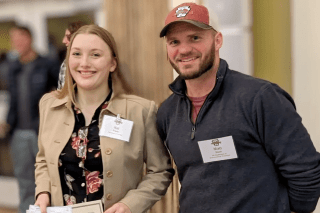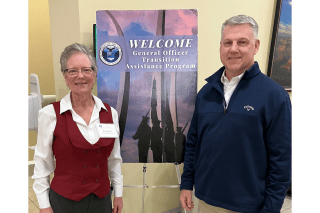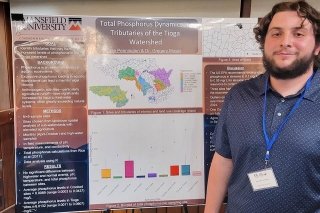CU Students Attend American Fisheries Society Meeting
University-wide
Posted
LOCK HAVEN, PA (03/29/2023) Commonwealth University’s (CU) biology department recently hosted the two-day Pennsylvania State Chapter of the American Fisheries Society’s 2023 annual meeting at Lock Haven.

Dr. Diana Rogers-Adkinson, provost, and Dr. Steve Seiler, biology professor, gave opening remarks about the theme of the meeting: “Fisheries Science After the Confluence,” referencing the integration of Lock Haven, Bloomsburg and Mansfield universities into Commonwealth University and the coming together of students and professionals in attendance.
“The work taking place in the CU biology department is a great example of strong collaboration. Faculty across the department have come together to create a center of excellence, which expands students’ research and career opportunities,” Rogers-Adkinson said. “Thank you to our dedicated faculty for their commitment to providing students these types of hands-on, meaningful experiences that both demonstrate the value of education and provide students real-world skills.”
The first day featured 13 platform presentations covering research projects on topics that ranged from water quality of streams and lake habitats to fish habitat improvement projects and invasive species management. The evening student poster session allowed faculty and professionals from state, federal and private agencies to continue learning about student research projects and to network.
Commonwealth University students Sierra Rider and Katarina Frantz both won awards for outstanding student research at the meeting. Rider, a 2019 Lock Haven biology graduate and current graduate student at Bucknell University, was named the Cooper Award winner for her research related to water temperature in streams flowing through agricultural fields, forested land or planted riparian buffers. Her work will help steer conservation funds toward conservation projects that provide the greatest benefit to stream communities.
Frantz, a senior in the fisheries program at Mansfield, took third place for her poster presentation, “Significant Differences in Average pH and Alkalinity Found Among Streams with Differing Bedrock.”
“Katarina’s work highlights the long-lasting impacts that acid precipitation can have on the water chemistry of streams across the northcentral region of Pennsylvania,” said Dr. Greg Moyer, who was a co-author on Frantz’s study. “This work allows us to focus conservation efforts on specific watersheds.”
More than 115 people attended the research talks and poster session. Funds for student awards were raised by a raffle for fish-related prizes, including native fish artwork from Jake Raville, a 2019 Lock Haven graduate.
The second day featured a series of technical workshops held in the East Campus Science Center. Students and professionals attended three different workshops to learn about the conservation and taxonomy of freshwater mussels, the taxonomy of mayfly species and statistical programming for use in fisheries science.
The workshops were taught by professionals from the Pennsylvania Department of Environmental Protection and experts in fisheries and aquatic ecology and allowed participants to earn continuing education credits through the American Fisheries Society.
The Commonwealth U Watershed Ecology Center (WEC) board of directors hosted the event and allowed CU WEC students an opportunity to showcase their research.
Greg Moyer, Mansfield faculty; and Drs. Steven Seiler, Daniel Spooner and Heather Bechtold, Lock Haven faculty, served as judges for the poster session, where more than $1,500 was awarded to students as research or travel awards.
“We are excited to host this showcase of research from Pennsylvania streams and lakes and we are excited to plan future collaborative work to address issues in aquatic communities across the commonwealth,” Bechtold said.
Numerous biology and WEC alumni from Lock Haven, Mansfield and Bloomsburg attended the meeting and were excited to reconnect with colleagues.
“It was great to host this meeting and to help kindle partnerships with conservation agencies across the state,” Seiler said. “We are already looking forward to our students presenting at the 2024 meeting and to continuing our research, outreach and educational activities in the Susquehanna River watershed through the CU Watershed Ecology Center.”





